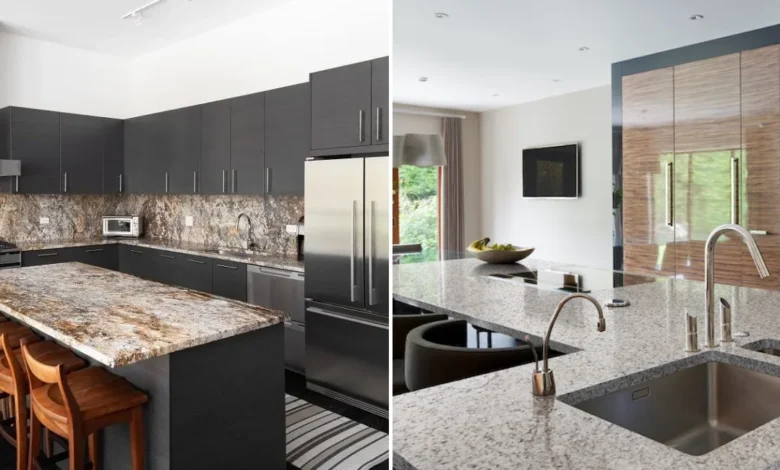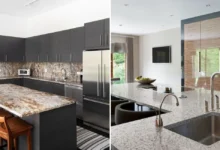Quartz vs. Granite: A Comprehensive Guide to Selecting the Right Worktop

Introduction
When designing or remodeling a kitchen, selecting the right worktop material is one of the most critical choices you’ll make. Among the array of options available, quartz and granite remain two of the most sought-after materials. Each offers remarkable benefits, including durability and aesthetic appeal, yet they differ significantly in terms of composition, maintenance needs, and performance. This guide delves into the key distinctions, advantages, and drawbacks of quartz and granite, helping you make an informed decision.
What is Quartz?
Quartz worktops are engineered surfaces, created by blending natural quartz crystals with resins, pigments, and other binding materials. Typically comprising 90–95% quartz, these worktops are non-porous, resilient, and versatile, offering the appearance of natural stone with enhanced functionality.
Advantages of Quartz Worktops
- Outstanding Durability
Quartz is renowned for its resistance to chipping, cracking, and abrasion, making it a reliable choice for high-traffic areas like kitchens. - Low Maintenance
Thanks to its non-porous nature, quartz does not require sealing and resists stains, liquids, and bacteria. Cleaning is as simple as using warm water and mild soap. - Wide Variety of Colors and Patterns
Engineered quartz offers an extensive palette of colors and designs, mimicking the appearance of natural stones like marble or granite, while providing additional design flexibility. - Uniform Appearance
Unlike natural stones, quartz delivers a consistent look without variations in color or pattern, ideal for achieving a sleek, modern aesthetic. - Resistance to Heat and Impact
Although not completely heatproof, quartz worktops can handle everyday kitchen use. However, it’s advisable to avoid direct exposure to high temperatures to prevent damage.
Disadvantages of Quartz Worktops
- Higher Cost
Premium quartz can often be more expensive than some granite options due to its manufacturing process and brand value. - Heat Sensitivity
The resins used in quartz are susceptible to heat damage, making it crucial to use trivets or heat-resistant pads to protect the surface. - Artificial Appearance
For those who prefer the unique, organic look of natural stone, quartz’s engineered consistency might lack the desired charm.
What is Granite?
Granite worktops are made from natural stone slabs that are cut, shaped, and polished. Composed of quartz, feldspar, and mica, granite is prized for its distinctive patterns and earthy beauty, which add character and sophistication to any kitchen.
Advantages of Granite Worktops
- Natural Aesthetic Appeal
Granite offers unmatched beauty, with each slab featuring unique patterns and colors that lend a one-of-a-kind character to your kitchen. - Exceptional Heat Resistance
Granite is highly resistant to heat, allowing hot pans and pots to be placed directly on the surface without risk of damage. - Long-Lasting Durability
Granite is robust and scratch-resistant, ensuring it can withstand the rigors of daily use. With proper maintenance, it can last a lifetime. - Boosts Home Value
As a premium material, granite is considered a valuable addition to a home, potentially increasing its market value.
Disadvantages of Granite Worktops
- Maintenance Requirements
Granite is porous and must be sealed periodically to prevent stains and bacterial infiltration, requiring more upkeep compared to quartz. - High Cost
Exotic granite slabs can be expensive, especially those with rare patterns or colors. - Inconsistent Patterns
While some homeowners cherish granite’s natural variations, others may find quartz’s uniformity more appealing.
How to Choose Between Quartz and Granite
- Budget Considerations
Both quartz and granite are premium materials, but costs vary depending on factors like rarity and brand. Quartz is often more affordable for those seeking consistency in design, while granite can be pricier if the stone is rare. - Design Preferences
Granite is ideal for those who admire natural beauty and unique, organic patterns. For a more uniform and contemporary aesthetic with a wider color selection, quartz is the better choice. - Ease of Maintenance
Quartz requires minimal upkeep, as it doesn’t need sealing and resists stains effortlessly. Granite, on the other hand, demands regular sealing to protect its porous surface. - Functional Needs
Families or avid cooks might prefer quartz for its superior resistance to scratches and stains. However, if placing hot pans directly on the counter is a common practice, granite’s heat resistance makes it a better option. - Environmental Impact
Granite, being a natural material, involves quarrying, which has environmental consequences. Quartz, while manufactured, uses resins and other chemicals, which can also impact sustainability. Look for eco-friendly certifications if sustainability is a priority.
Quartz vs. Granite: The Final Verdict
Both quartz and granite are exceptional choices, each with its own set of strengths. Quartz excels in low maintenance, uniformity, and versatility, making it perfect for modern kitchens. Granite, with its natural beauty, heat resistance, and unique patterns, is ideal for those who value authenticity and tradition.
Ultimately, the decision comes down to personal preferences, lifestyle, and budget. Regardless of your choice, investing in a high-quality worktop will not only enhance your kitchen’s functionality but also elevate its aesthetic and resale value.
Keep an eye for more news & updates on TechProMagazine!





